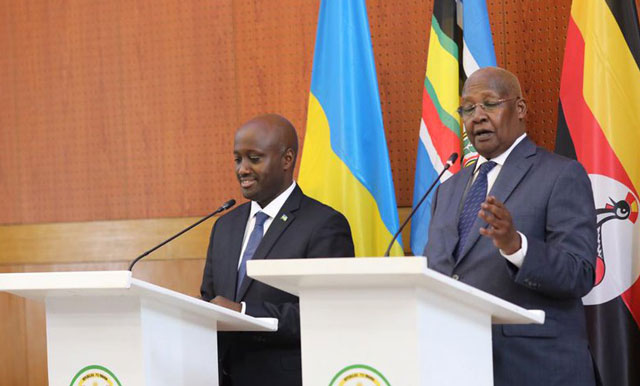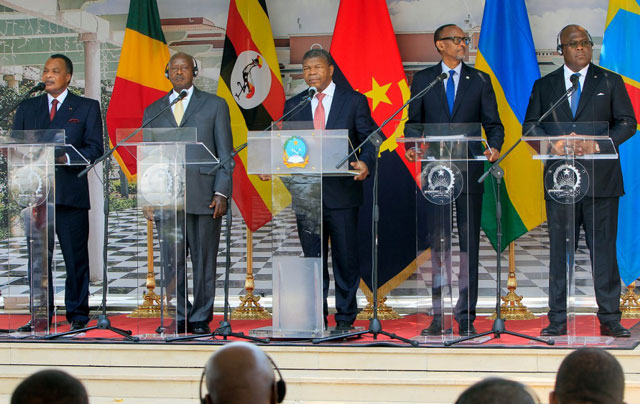
Kampala, Uganda | THE INDEPENDENT & AFP | Rwanda’s Minister of State for Foreign Affairs Olivier Nduhungirehe will lead a high level delegation to Uganda today for a second meeting to discuss the implementation of the Memorandum of Understanding signed in Angola in August.
This second meeting that aims at easing growing tension between the two countries, was supposed to have been held 30 days after they first met in Kigali in September, but was delayed.
When a date was last set after a long silence in November, Rwanda called it off. They did this as tension rose again after Rwanda shot dead two Ugandans on the border, and Kampala sent Kigali a protest note.
The second meeting was specifically expected to help resolve the Gatuna border closure, which has been shut since February 2019.
Trade between Uganda and Rwanda has fallen to near zero.
Today’s meeting set for Munyonyo will be attended by the delegations from Angola and Dr Congo who are the facilitators to the Luanda MoU

Pact to end months-long standoff still shaky
The presidents of Rwanda and Uganda in August signed an agreement in Angola to ease months of tensions after the two leaders exchanged accusations of spying, political assassinations and meddling.
Rwanda’s President Paul Kagame and Uganda’s Yoweri Museveni were once close allies but their relations have turned deeply hostile in a dispute that damaged trade between the east African neighbours.
The pact got off well, with a meeting of security chiefs and foreign ministers in Kigali in September, but a reciprocal meeting planned for Kampala after 30 days did not take place as planned. It was set for November 18, again moved from November 13 as the Angola Foreign Affairs Minister was said to be committed, then eventually called off by Rwanda.
In a press briefing in Kigali last month, Kagame complained about the delay, insisting he will only open the border once the issues on the table are resolved.
Rwanda abruptly closed the border with its northern neighbour in late February, severing a major economic land route.
Soon after in May, Ugandan police accused Rwandan soldiers of entering the country and killing two men.
At the Luanda meeting, the two leaders had agreed to respect each other’s sovereignty and that “of the neighbouring countries”. They also undertook to “refrain from actions conducive to destabilisation or subversion in the territory of the other party (and) acts such as the financing, training and infiltration of destabilising forces”.
The two leaders also agreed to “protect and respect the rights and freedoms” of people “residing or transiting” through their respective countries and to resume cross-border activities “including movement of persons and goods… as soon as possible”.
‘No destabilisation or subversion’
In the May meeting, Museveni said: “Uganda is fully committed to enforcing this agreement” which is set “to improve the political and economic relations between our countries”.
“We have agreed on a raft of issues… largely meant to improve our security, trade and political relations,” he said.
Heads of state including Angolan President Joao Lourenco, the Democratic Republic of Congo’s Felix Tshisekedi — who facilitated the talks — as well as Congo’s Denis Sassou Nguesso witnessed the signing in the Angolan capital Luanda.
Lourenco hailed the accord saying it showed the two leaders’ “willingness to overcome conflict”.
“You are a great example of how our continent should solve our differences, fears, disputes and conflicts… through dialogue,” said Lourenco.
Left unresolved, the row between the two leaders would risk dragging in their neighbours, threatening economic integration and regional stability in an already conflict-prone swathe of the continent.
The standoff escalated dramatically in March when Rwanda publicly accused Uganda of abducting its citizens and supporting rebels bent on overthrowing the government.
Apart from a brief interlude in June the frontier has remained mainly shut, damaging the economies of both countries reliant on cross-border trade.
Museveni — who has admitted meeting, but not endorsing, anti-Kagame rebels — harbours his own suspicions about his erstwhile ally. His officials have accused Rwandans in Uganda of spying, and some have been detained or deported.
Via the Standard

